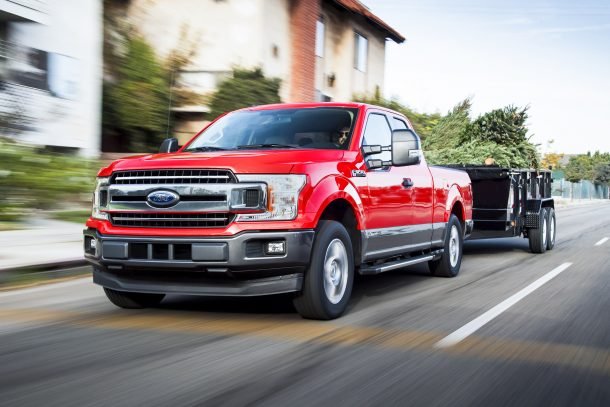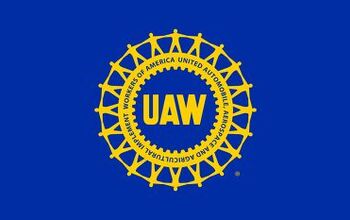Ford Suspending F-Series Production After Supplier Fire, Other Automakers Affected

As we told you yesterday, Ford announced it will temporarily halt production of the F-150 and Super Duty after a fire at Meridian Magnesium Products of America knocked out a key supplier. While the Blue Oval isn’t the only automaker affected by the supply shortage, as General Motors, Fiat Chrysler, BMW, and Mercedes-Benz also report the likelihood of production interruptions, Ford has the most to lose.
Taking the company’s most profitable vehicle out of the mix for a few weeks is a big deal. During a bad month, Ford might sell around 50,000 F-Series trucks in the United States. But a good month can see around 90,000 deliveries, so an unplanned idle probably has the automaker tugging at its collar a little. Fortunately, Ford currently has a 84-day supply of F-series pickups. That doesn’t mean it won’t feel the pinch if the wait on parts takes longer than expected.
The factory shutdown affects F-150 production at the Ford Kansas City Assembly Plant, which Ford said will last until at least May 14th. Super Duty lines at Kentucky Truck and Ohio Assembly have also shut down. Ford’s Dearborn Plant is expected to go down temporarily in the near future.
So, how far have the ripples spread?
According to Bloomberg, the supplier issue could cost the automaker as many as 15,000 F-150s per week. That’s a lot of money. As Ford’s breadwinner, the F-Series is responsible for roughly $40 billion in annual revenue. “The F-Series platform is critically important to Ford,” said Emmanuel Rosner, an analyst with Guggenheim Securities LLC. “We estimate it generates annual profits of at least $12 billion for the company, accounting for much more than the totality of Ford’s global [profits].”
So long as the factory shutdowns don’t last too long, Ford should be okay. Line workers will have to put in some overtime once the lights come back on, but no one’s expecting the trucks to suddenly vanish from dealer lots this summer. However, as there are not an overabundance of suppliers for magnesium parts, automakers could be in for a legitimate wait.
Hoping for a swift solution, Meridian Magnesium claims it is working as quickly as possible to get equipment to its plants in Canada and the United Kingdom. Its Eaton Rapids facility suffered a critical level of damage from the fire. While not totally destroyed, a large portion of the main building has been rendered unusable. Employees were told by a company official last week they should expect layoffs, but a portion of the facility is expected to remain open (plants 4 and 5 were unaffected by the fire). “It is our intention to return to normal operations as quickly as possible,” George Asher, Meridian Magnesium’s plant manager, told his staff. At this point, no one has a sound estimate for how long that may take.
“This is an extremely fluid situation,” said Ford spokeswoman Kelli Felker. “We are working hard to get replacement parts. We’re working closely with the supplier to manage the situation and determine next steps.”
The supply shortage is far reaching, affecting multiple automakers. Automotive News reported that Mercedes-Benz will have to rejigger production at its plant in Vance, Alabama, where it currently builds the C-Class, GLE, and GLS. The automaker said it “cancelled production shifts in certain areas and adjusted production hours for our team members this week. We continue to assess the situation and are working with Meridian to restore normal production levels.”
General Motors reported it would temporarily halt production of its Chevrolet Express and GMC Savana at its Wentzville Assembly plant in Missouri on Wednesday.
BMW claims parts shortages would hinder assembly of the X5, built in South Carolina. But it noted its currently supply has kept operations running for the time being.
As for Fiat Chrysler Automobiles, the company said production of the Chrysler Pacifica minivan in Windsor, Ontario, will also be affected by the fire. The automaker reports it will begin “adjusting production schedules as needed to minimize plant downtime,” promising to make up any lost production.
[Image: Ford]

A staunch consumer advocate tracking industry trends and regulation. Before joining TTAC, Matt spent a decade working for marketing and research firms based in NYC. Clients included several of the world’s largest automakers, global tire brands, and aftermarket part suppliers. Dissatisfied with the corporate world and resentful of having to wear suits everyday, he pivoted to writing about cars. Since then, that man has become an ardent supporter of the right-to-repair movement, been interviewed on the auto industry by national radio broadcasts, driven more rental cars than anyone ever should, participated in amateur rallying events, and received the requisite minimum training as sanctioned by the SCCA. Handy with a wrench, Matt grew up surrounded by Detroit auto workers and managed to get a pizza delivery job before he was legally eligible. He later found himself driving box trucks through Manhattan, guaranteeing future sympathy for actual truckers. He continues to conduct research pertaining to the automotive sector as an independent contractor and has since moved back to his native Michigan, closer to where the cars are born. A contrarian, Matt claims to prefer understeer — stating that front and all-wheel drive vehicles cater best to his driving style.
More by Matt Posky
Latest Car Reviews
Read moreLatest Product Reviews
Read moreRecent Comments
- SCE to AUX My son cross-shopped the RAV4 and Model Y, then bought the Y. To their surprise, they hated the RAV4.
- SCE to AUX I'm already driving the cheap EV (19 Ioniq EV).$30k MSRP in late 2018, $23k after subsidy at lease (no tax hassle)$549/year insurance$40 in electricity to drive 1000 miles/month66k miles, no range lossAffordable 16" tiresVirtually no maintenance expensesHyundai (for example) has dramatically cut prices on their EVs, so you can get a 361-mile Ioniq 6 in the high 30s right now.But ask me if I'd go to the Subaru brand if one was affordable, and the answer is no.
- David Murilee Martin, These Toyota Vans were absolute garbage. As the labor even basic service cost 400% as much as servicing a VW Vanagon or American minivan. A skilled Toyota tech would take about 2.5 hours just to change the air cleaner. Also they also broke often, as they overheated and warped the engine and boiled the automatic transmission...
- Marcr My wife and I mostly work from home (or use public transit), the kid is grown, and we no longer do road trips of more than 150 miles or so. Our one car mostly gets used for local errands and the occasional airport pickup. The first non-Tesla, non-Mini, non-Fiat, non-Kia/Hyundai, non-GM (I do have my biases) small fun-to-drive hatchback EV with 200+ mile range, instrument display behind the wheel where it belongs and actual knobs for oft-used functions for under $35K will get our money. What we really want is a proper 21st century equivalent of the original Honda Civic. The Volvo EX30 is close and may end up being the compromise choice.
- Mebgardner I test drove a 2023 2.5 Rav4 last year. I passed on it because it was a very noisy interior, and handled poorly on uneven pavement (filled potholes), which Tucson has many. Very little acoustic padding mean you talk loudly above 55 mph. The forums were also talking about how the roof leaks from not properly sealed roof rack holes, and door windows leaking into the lower door interior. I did not stick around to find out if all that was true. No talk about engine troubles though, this is new info to me.


































Comments
Join the conversation
Now imagine that this fire happened after Ford ceased car production. Fire Hackett now.
I'm wondering how EBFlex and akear will spin this as being Ford's fault....